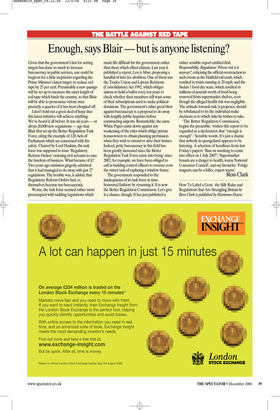Enough, says Blair — but is anyone listening?
Given that the government’s lust for setting targets has done so much to increase bureaucracy in public services, one could be forgiven for a little scepticism regarding the Prime Minister’s latest target: to reduce red tape by 25 per cent. Presumably a new quango will be set up to measure the exact length of red tape which binds the country, so that Blair will be able to pronounce victory once precisely a quarter of it has been chopped off.
I don’t hold out a great deal of hope that this latest initiative will achieve anything. We’ve heard it all before. It was six years — or about 20,000 new regulations — ago that Blair first set up the Better Regulation Task Force, citing the example of 120 Acts of Parliament which are concerned with fire safety. Chaired by Lord Haskins, the task force was supposed to issue ‘Regulatory Reform Orders’ ordering civil servants to ease the burdens of business. What became of it? Two years ago ministers gingerly admitted that it had managed to do away with just 27 regulations. The trouble was, it added, that Regulatory Reform Orders had, er, themselves become too bureaucratic.
Worse, the task force seemed rather more preoccupied with tackling regulations which made life difficult for the government rather than those which affect citizens. Last year it published a report, Less is More, proposing a handful of laws for abolition. One of them was the Trades Union and Labour Relations (Consolidation) Act 1992, which obliges unions to hold a ballot every ten years to check whether their members still want some of their subscriptions used to make political donations. The government’s other great blow against bureaucracy is a proposal to do away with lengthy public inquiries before constructing airports. Remarkably, the same White Paper came down against any weakening of the rules which oblige private homeowners to obtain planning permission when they wish to extend or alter their homes. Indeed, petty bureaucracy in this field has been greatly increased since the Better Regulation Task Force came into being: since 2002, for example, we have been obliged to call in building control officers to oversee even the minor task of replacing a window frame.
The government responded to the inadequacies of its task force in timehonoured fashion: by renaming it. It is now the Better Regulation Commission. Let’s give it a chance, though. It has just published a rather sensible report entitled Risk, Responsibility, Regulation: Whose risk is it anyway?, criticising the official overreaction to such events as the Hatfield rail crash, which resulted in trains running at 20 mph, and the Sudan 1 food dye scare, which resulted in millions of pounds worth of food being removed from supermarket shelves, even though the alleged health risk was negligible. The attitude towards risk, it proposes, should be rebalanced to let the individual make decisions as to which risks he wishes to take.
‘The Better Regulation Commission,’ begins the preamble, ‘wishes this report to be regarded as a declaration that “enough is enough”.’ Sensible words. It’s just a shame that nobody in quangoland appears to be listening. A selection of headlines from last Friday’s papers: ‘Ban on smoking to come into effect on 1 July 2007’; ‘Supermarket brands are a danger to health, warns National Consumer Council’; and my favourite: ‘Fridge magnets can be a killer, expert warns’.
Ross Clark
How To Label a Goat: the Silly Rules and Regulations that Are Strangling Britain by Ross Clark is published by Harriman House.


























































































 Previous page
Previous page